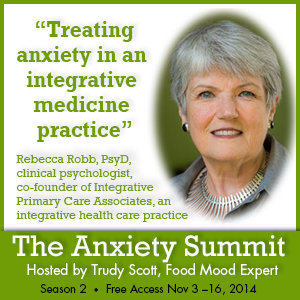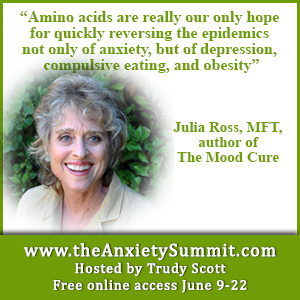
GABA (gamma-aminobutyric acid) is one of my top nutrient recommendations for clients with physical tension, anxiety, overwhelm and panic attacks. I’m often asked if it really works and is it even worth taking so here is some feedback from practitioners from the Anxiety Summit, all of whom I consider experts on the topic.
Julia Ross, MFT, pioneer in the field of amino acid therapy, my mentor and the author of The Mood Cure and The Diet Cure shares this wisdom about GABA during our interview: Eliminating Anxiety: Amino Acid Therapy and Adrenal Balancing on season 1 of the Anxiety Summit:
Among other things, GABA relaxes the nerves in the muscles in the body. One of the most common kinds of feedback that we get from people who are doing a GABA trial is that it seems to take effect so quickly. This may be because, unlike tryptophan, which has to be converted into serotonin, GABA is the neurotransmitter and the amino acid all in one and requires no conversion.
There isn’t often a GABA discussion when the topic of the blood-brain-barrier doesn’t come up and whether GABA actually does work. Of course Julia addresses this too:
There is a myth going around, based on one old study, that GABA doesn’t cross into the brain, that it doesn’t cross the blood-brain barrier. But there are other studies that show that it does [here is a paper published earlier this year], and our clinical experience is overwhelming. This is the most popular trial that we do, the GABA trial, using only 100 mg. It zips right into the brain, and people immediately feel relaxed physically and mentally.
I see this with my clients on a daily basis and I can certainly attest to that personally too. I like to share that I was a “GABA girl”: when I had my terrible anxiety and panic attacks in my late 30s anxiety, GABA worked beautifully for me. It was amazing and life-changing! Zero anxiety and no more panic attacks!
We are all individual and you may find that theanine works better for you than GABA. Julia talks about this too:
I would say about 15 to 20 percent of people who need this GABA-type relief of the tension and stress, don’t seem to get it from GABA. In those cases, most of them do get it from the amino acid, l-theanine, instead, in our experience.
Dr. Josh Friedman, is dear friend, colleague and integrative psychotherapist who uses amino acids and other nutritional approaches in his practice. I also had the honor of interviewing him on season 1 of the Anxiety Summit. I ask him if he uses GABA with his patients and what he thinks about the naysayers. I just love his answer:
[GABA] is definitely something I use. I am not a biochemist, so I actually don’t really know whether it crosses the blood/brain barrier, nor do I care actually. The first question should be, is it harmful? Are any of these things going to cause harm? And the answer with all the amino acids are no, they’re not going to cause harm, especially when compared to psychiatric medicines. The second question is, does it work? Is it helpful for our patients that we see in our practice?
GABA certainly worked for Meme Grant, GAPS Practitioner, Nutritional Therapist, FNTP, and fellow African. She had anxiety, panic attacks, didn’t enjoy speaking in public, had insomnia and was an emotional eater. I also interviewed her in season 1 and she shared this:
I took GABA for the first time in the afternoon and had no panic attacks that afternoon, and I took one in the evening and I did that for a couple of weeks, and I haven’t seen a panic attack since.
I find that many people do well with a combination of GABA and one or more of theanine, taurine and glycine. All of these are calming amino acids and since we are all unique you may find that one of these combinations work better for you.
Dr. Hyla Cass, M.D. board-certified in psychiatry and integrative medicine and the author of Natural Highs and The Addicted Brain and How to Break Free, talks about this in our interview: The Addicted Brain and How to Break Free
If someone has anxiety, it’s not a Valium or a Xanax deficiency. It could be a GABA deficiency. And that could be due to stress. So if you’re low in GABA, there are some really cool things to take – theanine, glycine, taurine. The different nutrients work together and when we add them together, it’s more than the sum of its parts. So adding glycine and GABA together is going to give you a better result and you don’t have to use as much as each of the individual ones. So that’s nature’s Valium.
Jonathan Prousky, ND, MSc, editor of the Journal of Orthomolecular Medicine and author of Anxiety: Orthomolecular Diagnosis and Treatment shares this in our season 2 interview: Tapering off psychiatric drugs so they do not ruin your life
I have found GABA to be invariably helpful and I don’t really know exactly how GABA works but I know it to be very, very safe and, to me, that is fundamentally important. It’s not associated with any withdrawal, with any tolerance, with any habituation, so people can try it without a lot of concern.
Dr. Prousky uses both regular crystalline GABA and pharmaGABA but prefers the latter. He uses it as part of his SRR model for helping his patients taper of psychiatric drugs such as benzodiazepines. SRR stands for sedation, relaxation and regulation:
- Sedation: one gets the sedating effects of GABA (he uses pharmaGABA at a dose of 100-200 mg)
- Relaxation: niacin at a dose of 250-500 mg (immediate-release)
- Regulation: melatonin (generally about 3mg) to helps regulate the sleep-and-wake cycles
GABA really does work if your anxiety is a result of low GABA levels. As Julia so wisely says:
On a scale of zero to ten, zero is not an unrealistic goal when it comes to anxiety. It’s really the human potential and GABA [and tryptophan] give us access to it.
So we have many expert opinions but the best way to figure out if GABA works is to try it. You’ll know within 5 minutes if it’s working for you. This is one of the reasons I love the amino acids: you get results right away and it makes you feel less anxious right away, giving you hope while you deal with other factors that may be contributing to your anxiety.
How much GABA do we need and how do we take it? I find that GABA is most effective when taken sublingually. Source Naturals GABA Calm is a great sublingual that contains 125mg GABA, 50mg Glycine, 20mg taurine, some magnesium and 25mg N-Acetyl L-Tyrosine. I also really like Nutritional Fundamentals for Health GABA-T SAP which contains 300mg GABA 300 mg and 150mg theanine. This is pleasant-tasting when opened on to the tongue and seems to be most effective when held there for about 2 minutes. GABA products that contain 500mg and 750mg are often too much for most of my clients.
You can find these and other GABA products that I recommend here
If you’d like to learn more about GABA from the above experts, you can get details of the Anxiety Summits here
You’ll also learn about many other nutritional and biochemical causes of anxiety: gut health and the microbiome, hormone imbalance, methylation issues, other low neurotransmitter levels, pyroluria (causing social anxiety), oxalates/gluten (special diets), pyschoneuroendocrinology, heavy metals, poor liver health, adrenal issues like high cortisol, mold, candida, parasites and much more!
Have you used GABA or any of the other calming amino acids and found benefits? Please share what product and how much worked for you?
If you have not tried GABA, were you a naysayer but now feel more inclined to look into this?

